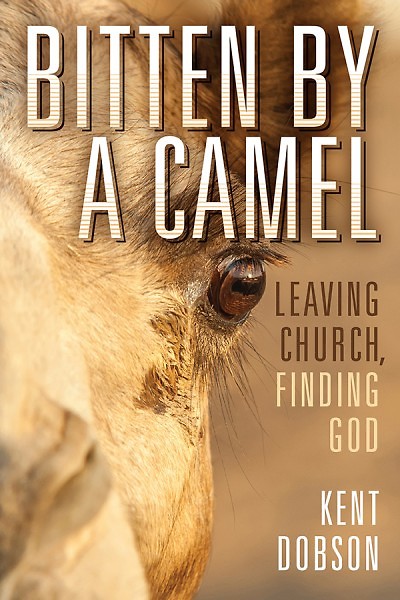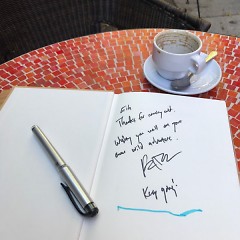Kent Dobson climbed Mount Sinai in search of the God who had eluded him. Instead he got Bitten by a Camel. Recently, I sat down with him at The Sparrows Coffee & Tea & Newstand on Wealthy Street to find out more.
EI: Why did you need to write this book "Bitten by a Camel, Leaving Church, Finding God?"
KD: I felt as if this was a book that I needed to get out of my system. I wanted it to be two things: I wanted it to be personal, and I wanted it to be helpful. To those people who had similar story lines—so that’s what I set about trying to do.
EI: In your book, there is a strong pull of geography and landscape. Your travels clearly have impacted your writing. Can you talk about how?
KD: Geography is a good way of putting it. I didn’t feel at home in church world. I felt uncomfortable. I found Jerusalem, Israel, Mount Sinai is in Egypt, as alluring. I thought, “If I’m going to take faith or spirituality or even the Bible more seriously, than why not move there? Why not move to the place where these stories started?” I had been to Israel once before, and I had found that the stories seemed to be less like a fairy tale once they were grounded in a real landscape. There is a difference between thinking something Theologically, and then, I’m not sure how I would describe it, but just a deeper knowing, on a body level.
EI: Can you talk more about that deeper knowing? Also, did you experience grief in this process of understanding?
KD: I’m not really sure I felt I could figure it out. I guess that was a longing. Maybe the, I like to call it ‘Theological Math,’ would add up eventually…but it just didn’t add up. Grief is a good word for something that I was invited to touch upon, but there is a certain amount of grief associated with my own sort of collapsing theology. [That collapse] created enough pressure, maybe that’s the wrong word for it, but created certain openings. In a way it did lead to a kind of grief. There are things to grieve when your world view stops working.
EI: It seemed to me you write about experiences in your faith from early childhood that needed to fall away. As if layer upon layer of sediment and accumulated. That sediment got compressed over time, and needed to be sifted, to see what was left.
KD: I connect to what you are saying. I think that is what the great stories would refer to as the “Journey to Soul.” Not an accent to God, but a decent to God. Which requires a certain amount of archaeology, of digging through the sediment, as you said. And for me, a fair amount of rejection of religious framework was needed. I had to leave religion in a sense to go any further on that particular discovery. I wonder if that’s what people really long for. Even in their questions about God, the church, whatever. They are longing for that soul orientated way of being in the world. That’s what I am committed to. That’s in part why I wrote the book because if I can help, in some way, those people who have similar stories to my own with their process of discovering such a thing, then that means the world is a better place. Because more and more people bring that forth in the world.
The Rapidian, a program of the 501(c)3 nonprofit Community Media Center, relies on the community’s support to help cover the cost of training reporters and publishing content.
We need your help.
If each of our readers and content creators who values this community platform help support its creation and maintenance, The Rapidian can continue to educate and facilitate a conversation around issues for years to come.
Please support The Rapidian and make a contribution today.
Comments, like all content, are held to The Rapidian standards of civility and open identity as outlined in our Terms of Use and Values Statement. We reserve the right to remove any content that does not hold to these standards.


